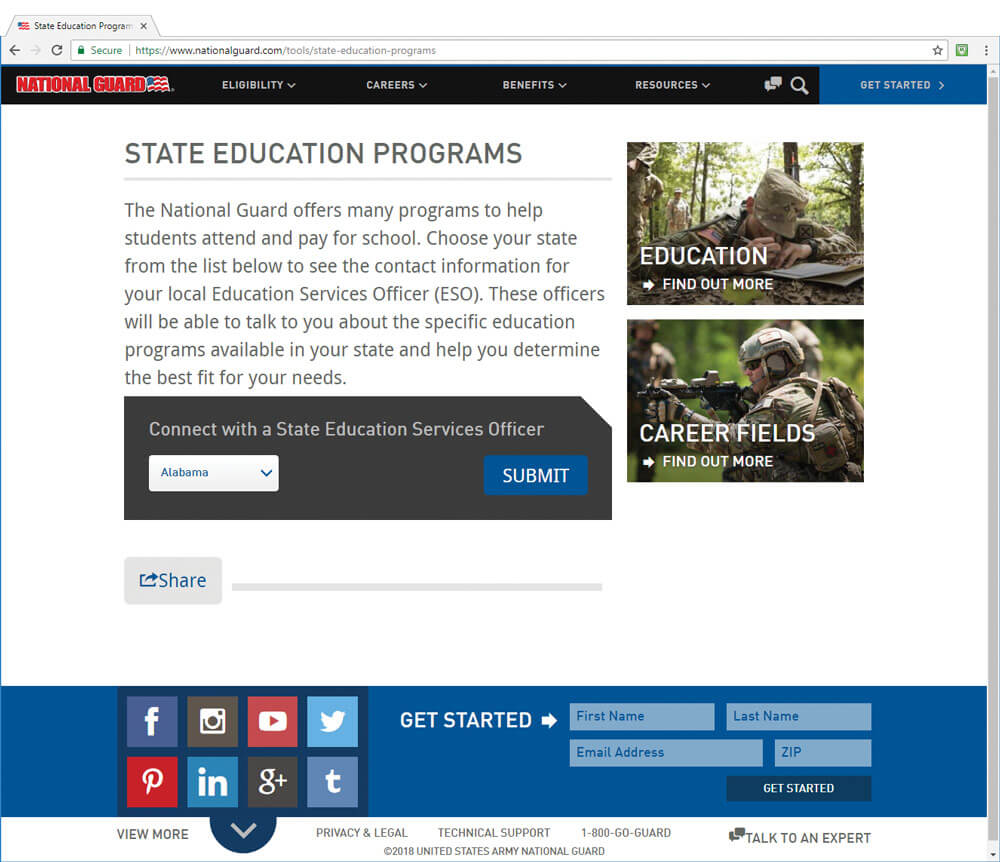Idaho Army National Guard SGT Seth Gaskins left Boise in 2011 to attend college in Oklahoma on a wrestling scholarship. He was there for a year before returning home to continue his education, this time without a scholarship to pay the way. That summer, he began working on temporary military orders and learned how the National Guard could help pay for his education through tuition assistance programs.
“In the summer of 2012, I worked in the supply section for recruiting and retention,” SGT Gaskins said. “My sergeant at the time told me if I’m going to school, I need to talk to the education office. So, I went there and they helped me figure out how to use my benefits to pay for school.”

Gaskins graduated from Boise State University with a bachelor’s degree in exercise science. He is currently studying to get his certification as a strength and conditioning coach, while continuing to serve in the Idaho Army National Guard as a signal specialist in C Company, 116th Brigade Engineer Battalion.
“I worked my butt off to finish school,” said SGT Gaskins. “I did it in five years, and I did it debt-free. I hope a lot of other Soldiers choose to do that because there are great benefits out there, some now that I didn’t even have.”
When SGT Gaskins began taking classes at Boise State, he said the only benefits available to him were the GI Bill and Federal Tuition Assistance. At that time, the two benefits could be used together, but only to pay for up to 16 semester credits per year. In his first year in the program, Gaskins took all 16 credits in one semester and had to cover the next semester’s tuition himself.
“I buckled down and drained my bank account for the next semester,” SGT Gaskins said. “From then, I was always flirting with that line of ‘I’m going to run out of cash to go to school.’”

That was the case until the Idaho Army National Guard’s State Education Assistance Program began in 2015. Gaskins said the opportunity to use federal and State tuition assistance together was the only reason he was able to attend school full-time and finish his degree without the burden of huge student loans.
The State program was first designed to help Soldiers pay tuition and associated costs not fully covered by other education benefits, such as the GI Bill and Federal Tuition Assistance. Like other programs, it aims to support Soldiers’ professional and personal development goals, but it offers more opportunities to choose various educational paths to achieve future employment.
Idaho Soldiers Can Receive up to $5,000 a Year
Of the 54 Army National Guard forces across the States and Territories, 52 offer tuition assistance programs. The assistance is offered at varying amounts depending on the State, and is always in addition to federal assistance benefits. Some States, such as Connecticut, Nevada and New Jersey, offer qualifying Soldiers 100 percent of the tuition cost to an eligible college, university, or trade school. Others offer tuition grants that cover a specific number of credit hours or a percentage of tuition fees. Still others, like Idaho, offer a specific amount of coverage per semester or year.
“The State program helps Soldiers achieve a degree and find jobs without the burden of paying off student loans,” said CPT Sean Crow, Idaho Army National Guard State education officer. “We need our Soldiers to be able to get an education that does not give them a future of debt. They also need to keep employed so they are ready to serve at a moment’s notice without finances taking their minds away from doing their duty.”
“Education assistance is a great benefit,” said SGT Gaskins. “It’s really cool that we are educating the National Guard and sending Soldiers to school for free. All they have to do is use it.”
Not Limited to an Associate, Bachelor’s or Master’s Degree
In Idaho, and many other States, both full-time and traditional Guard Soldiers who use State assistance may attend any regionally or nationally accredited vocational school, college or university that has a business office in the State. Soldiers are even able to earn certifications for career specialties such as welding, hairstyling or piloting.

Many State programs, like in Idaho, have no time limit for eligibility, limit of credit hours or limits attached to previously obtained degrees. That means Soldiers are eligible to use State assistance for as long as they need it and for any degree or certificate, regardless of degrees or credits previously earned.
1LT Phillip Bettis, a medical detachment clinical training officer, is receiving $5,000 a year through the Idaho Guard’s State assistance to pay toward his doctor of pharmacy at Idaho State University. Since 1LT Bettis no longer qualifies for other funding benefits, he said every little bit helps.
“It definitely helps relieve a big burden – especially with having a family and having to worry about paying for food, diapers and living expenses,” said 1LT Bettis. “It takes a lot of that stress away.”
Focus More on School and Less on Paying Bills
Soldiers who take advantage of their education benefits may have more time to focus on school, as well as the opportunity to take more classes at no additional cost to them.
SPC Matthew Garcia, E Company, 145th Brigade Support Battalion, and a student at Boise State University, only recently became aware of the opportunity to use both federal and State tuition assistance. For the past few years, he could only afford to attend school part time and would work any job he could find to help pay his tuition.
SPC Garcia is now attending school full time with no out-of-pocket cost by using both federal and State tuition assistance programs. With the money he is saving on tuition, SPC Garcia is able to pay other bills such as rent – focusing less on work and more on school.
“Since my tuition is being paid for, I can save the money I earn [at work] and put it toward paying rent and bills,” SPC Garcia said. “Next fall, I’ll have even more money saved up from working in the summer, so I’ll be able to relax and focus on school without worrying about making rent.”
Learn About Your State’s Tuition Assistance Program
Requirements and amounts paid for tuition assistance vary from State to State. For instance, a few States require Soldiers to make a six-year commitment to qualify for State assistance. Some States require Soldiers to maintain a grade point average of 2.0 – Missouri requires a 2.50 GPA – to continue to receive tuition assistance. Some require completion of Basic Training to enter the program. Alabama has a 10-year eligibility cap after Soldiers begin receiving tuition assistance.
Kentucky covers tuition fees of 12 hours per semester at the in-State tuition rate while Montana pays $100 per credit up to $1,200 a semester. South Dakota pays 50 percent of all tuition fees.
North Carolina’s contribution varies year by year, as the amount is set by the North Carolina State Education Assistance Authority each fiscal year. In South Carolina, tuition for Army National Guard Soldiers is capped at $4,500 per year and cannot exceed a total of $18,000. Virginia covers tuition and fees of $8,000 per year.
The Virgin Islands covers up to 32 credits across a Soldier’s entire service time in the State’s National Guard. Missouri pays $276.20 per semester hour up to 100 percent of the in-State tuition rate. Michigan covers $600 per semester hour up to $6,000 per year. The District of Columbia pays up to $2,000 per year for tuition and $500 for fees.
In California, depending on the type of school, the maximum nine-month award amount for an undergraduate is $12,240.
A quick summary of each State’s tuition assistance program can be found at NationalGuard.com/Education-Programs/State-Tuition-Assistance.
Contact Your State’s ESO
The Army National Guard offers a wide range of programs designed to help students attend and pay for school. For detailed information about your State’s programs, contact the Education Services Officer (ESO) in your State through this webpage: NationalGuard.com/Tools/State-Education-Programs. Choose your State from the dropdown list to find the contact information for your local ESO, who can help you determine the best program fit for your needs.
By Contributing Writer 2LT Crystal Farris



